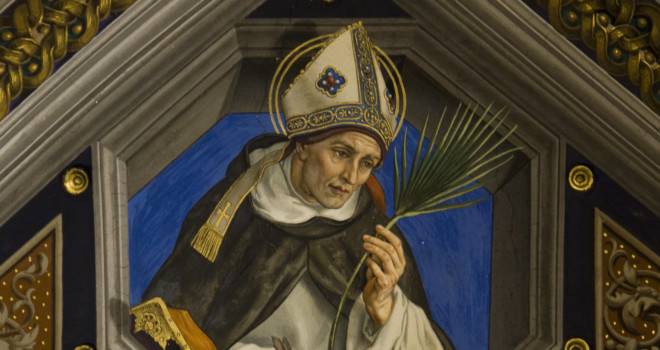News
Saint Albert the Great: A Figure of Enduring Relevance

17 november 2023
Saint Albert the Great, also known as Albertus Magnus, whose feast is celebrated this week, was a remarkable scholar, philosopher, theologian, and scientist who lived in the 13th century. Despite the centuries that have passed since his time, Saint Albert remains a figure of enduring relevance in various fields. His contributions to science, philosophy, and theology continue to inspire and inform modern scholars, scientists, and theologians. At Domuni Universitas, we draw inspiration from figures like him, who guide us spiritually and intellectually in our quest for a better, fairer world. In this article, we will explore how Saint Albert the Great's legacy endures and why he remains a significant figure in today's world.
Firstly, Saint Albert the Great was a pioneering figure in the history of science. His work covered a wide range of disciplines, including botany, zoology, astronomy, and chemistry. His meticulous observations and writings laid the foundation for many scientific advancements. Saint Albert's contributions to botany and zoology include detailed observations of plants and animals. His emphasis on empirical observation and the classification of species influenced the development of modern biology. His writings, such as "De Vegetabilibus" and "De Animalibus," serve as early examples of biological studies and remain relevant for understanding the natural world. In addition, Albert the Great's interest in the heavens led to significant contributions to the field of astronomy. He studied the works of ancient Greek and Islamic astronomers and expanded upon their ideas. His insights into celestial phenomena influenced later astronomers and contributed to the development of modern astronomy. Furthermore, Saint Albert had a different kind of interest in alchemy - which was often a mystical pursuit - when compared to others. His approach was rooted in a commitment to understanding the natural world. His exploration of materials and substances laid the groundwork for the development of chemistry as a scientific discipline.
Secondly, Albertus Magnus, a prominent figure in medieval philosophy, is renowned for his significant contributions to the integration of faith and reason, a legacy that resonates in contemporary thought. Central to his influence is his pivotal role in the Scholastic tradition, where he played a key part in reconciling faith and reason. Albert's philosophical approach emphasized the use of reason and critical thinking, establishing a precedent for modern philosophical inquiry. Beyond Scholasticism, Saint Albert’s enduring impact extends to the realm of ethics and morality. His works on these subjects remain relevant in current discussions concerning human behavior and the societal role of ethics. Albert's ethical writings delve into crucial topics such as virtue, happiness, and the moral life, offering insights that continue to be pertinent today. In this context, Domuni Universitas recommends this course as a solid foundation of ethics as well as this course as an introduction to moral theories in bioethics. Moreover, his contributions to metaphysics, encompassing views on the nature of reality and the existence of God, persistently inform ongoing discussions in metaphysical philosophy and theology, cementing Albertus Magnus's enduring relevance in contemporary philosophical discourse. Domuni also brings forward a plethora of courses on metaphysics such as the “Metaphysics or Philosophy of Being” course or this multi-part course.
Lastly, Doctor of the Church, Saint Albert the Great left an indelible mark on Catholic theology through substantial contributions that resonate in contemporary religious discourse. His writings, particularly his exploration of the intricate relationship between faith and reason, remain highly relevant. Saint Albert underscored the compatibility of faith and reason, positing that knowledge acquired through reason complements and reinforces the truths of faith - a perspective crucial in the ongoing dialogue between science and religion. Moreover, his theological insights into the created world emphasize that the natural realm harmonizes with religious belief, reflecting the wisdom and creativity of the Creator. This perspective finds particular relevance in discussions surrounding environmental ethics and stewardship. Additionally, Saint Albert's commitment to interfaith dialogue, notably engaging with Islamic scholars of his time, serves as a model for present-day endeavors to foster understanding and cooperation between diverse religious traditions.
Saint Albert the Great's legacy endures in the 21st century, making him a figure still relevant to this day. His contributions to science, philosophy, and theology continue to influence contemporary thought and scholarship. Saint Albert's emphasis on the compatibility of faith and reason, his pioneering work in various scientific fields, and his philosophy provide valuable insights and inspiration for modern scholars, scientists, and theologians. In a world where the intersection of faith and reason, science, and philosophy continues to be explored, Saint Albert the Great's enduring relevance is a testament to the timeless nature of his ideas and contributions.
Here are a few à la carte/individual courses we offer to take the above topics further:

